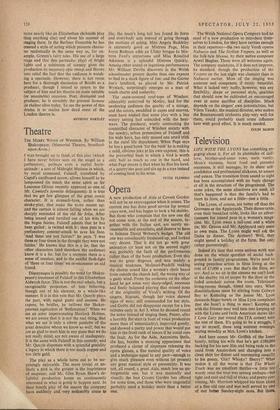Opera
A NEW production of Aida at Covent Garden will not be an extravagance when it comes. The current one has done good service fo,r several years now, and has begun to look a hit shabby. But those who complain that the new one did . not come now, at the end of the season, to- gether with the Italian cast, are surely un- reasonable and unrealistic, and deserve to have to balance David Webster's budget. The old one was considerably freshened up, and looked very decent. That it did not go with great animation (at least not on the second night) was probably the fault of the performance rather than of the basic production. Even this was no great disgrace, and was mainly a musical weakness, Molinari-Pradelli making the chorus sound like a women's choir heard from outside the church hall, the wrong way of a gusty wind. From the orchestra on the other hand he got some very sharp-edged, sonorous and finely balanced playing that missed none of the originality of Verdi's writing. Of the singers, Stignani, though her voice showed signs of wear, still commanded for her style, and Gobbi did not disappoint except for a few minutes early in Act 3, when he shouted round the notes instead of singing them. Penno, after a horribly flat start (a fault of voice production more than of unmusicality), improved greatly, and showed a purity and power that would put him in the front rank of tenors if he could cure the fault. As for the Aida, Antonietta Stella, she has, besides a stunning appearance that produced a clatter of sixpences releasing the opera glasses, a fine natural quality of voice and a technique equal to any part—enough to give much pleasure even without (at present) any great musical style or personality. It was not, all round, a great Aida, much less an un- forgettable one, but it was musically and visually the best Covent Garden has offered for some time, and those who were ungrateful probably need a holiday more than a better one. The Welsh National Opera Company had no need of a new production to introduce them- selves to London, for they have rarities enough in their repertory—the two early Verdi operas Nabucco and The Sicilian Vespers, as well as the folk-tale Menna, by their native composer Arwel Hughes. These were all welcome again. The company maintains, if it does not improve, its standard, though the production of the Vespers on the last night was clumsier than in Nabucco earlier. Most of the singing was accurate and competent, if rarely beautiful. What it lacked very badly, however, was any flexibility, shape or personal style, qualities that should now be cultivated or encouraged even at some sacrifice of discipline. Much depends on the singers' own potentialities, but Vilem Tausky, the musical director, who makes the Bournemouth orchestra play very well for them, could probably exert some influence here with good effect, It is much needed.
COLIN MASON


















































 Previous page
Previous page